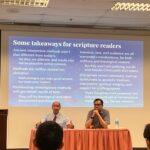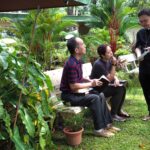
Resting in God: the Practice of Silence

“Be watchful inwardly; and be watchful outwardly”
– Abba Poemen, a desert father
“Silence is a way of waiting, a way of watching, and a way of listening to what is going on within and around us. It is a way of interiority, of stopping and then of exploring the cellars of the heart and the center of life. It is a way of entering within, so that we do not ultimately go without. Silence is never merely a cessation of words; that would be too restrictive and too negative a definition of silence. Rather, it is the pause that holds together–indeed, it makes sense of–all the words, both spoken and unspoken. Silence is the glue that connects our attitudes and our actions. Silence is fullness, not emptiness; it is not an absence, but the awareness of a presence”
– John Chryssavgis, In the Heart of the Desert, pp.45-46.
Step 1: Settling down (Voices without)
- Find a conducive spot in your home where you may sit down comfortably for a while.
- Take a few deep breaths to settle down a little. You may wish to close your eyes.
- As you do, pay attention to what you are hearing. Listen to the sounds around you. They may be the sounds of children at play, spouses at work, birds chirping, the refrigerator’s gurgling or the noise from a hair dryer.
Step 2: Tuning in (Voices within)
- Pay attention to what is going on within you. These are voices from within your mind and heart.
- They may be triggered by a sound from the outside–the children’s click on the keyboard, for instance, may remind you of the work you have yet to complete.
- Or they may be triggered by a thought from within–a memory surfaces and it triggers an emotion of regret, fear, or some measure of anxiety.
- Be alert to them. Do not try to shut them out of your mind and heart. Acknowledge their presence and commit them to God in prayer. Should you so wish, you may pray the following prayer:
“O Lord, I come to You just as I am. I commit to You these voices. Still them as Jesus stilled the storm.”
Step 3: Resourcing (Turning to Scripture)
- Turn to the Word of God after you have noticed some of these voices
- Let the Word speak to you as you read it slowly.
- We have chosen Psalm 62 for our theme “Resting in God: the Practice of Silence”
- Read Psalm 62:1-2 slowly in the New International Version:
Truly my soul finds rest in God;
my salvation comes from him.
Truly he is my rock and my salvation;
he is my fortress, I will never be shaken.
- Read the two verses slowly a second time, but now in the English Standard Version:
For God alone my soul waits in silence;
from him comes my salvation.
He alone is my rock and my salvation,
my fortress; I shall not be greatly shaken.
- The two versions of Ps 62:1-2 help us to appreciate that resting in God involves a time where we wait in silence before God. We wait in silence for God to save us.
- The psalmist appears to be someone in a place of weakness (v.3) even though he may have previously enjoyed a position of strength (v.4). These verses may help you to reflect on your current situation.
- Take a few minutes to read through the entire psalm slowly in any version of your choice. Pause at points that especially speak to you and speak with God concerning your thoughts and feelings.
Step 4: Re-Entering (Re-engaging life with the offer of God’s presence)
- After you have spent sufficient time immersed in God’s Word and your conversation with God, bring your time to a close by resting in what the Lord has given to you.
- It may be a word that reminds you of God’s promise, a theme that assures you of God’s presence or another form of resource that God has given you.
- Write it down in your journal or somewhere significant for reference during the day.
- Spend the final few minutes in silence.
- Then gradually re-enter your day’s activity with the resource that God has deposited in your heart. You may wish to bring this short time of silent meditation to a close with the following prayer:
“O Lord, I will trust in You and wait for Your answer.”
- As you resume your activity, may God’s presence go with you.
Rev Dr Jimmy Tan, Chaplain
Lecturer in Pastoral and Practical Theology








